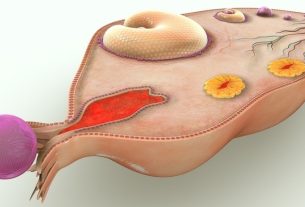Shortness of breath during pregnancy is normal, especially in the last trimester, as as the baby grows, the diaphragm and lungs are compressed and the ability of the rib cage to expand is reduced, creating the feeling of shortness of breath.
However, shortness of breath can also indicate more serious conditions such as asthma, anemia, pulmonary embolism or pre-eclampsia, especially when it is severe, occurs suddenly or is accompanied by symptoms such as coughing, chest pain or wheezing, palpitations or dizziness. .
In these cases, you should go to the emergency room immediately so that the cause of shortness of breath can be diagnosed and the most appropriate treatment can be started, if necessary.

7 causes of shortness of breath during pregnancy
The main causes of shortness of breath during pregnancy are:
1. Baby Growth
The baby’s growth, especially in the last trimester of pregnancy, between weeks 28 and 40 of pregnancy, can cause shortness of breath.
This is because as the baby grows and the uterus expands, the lungs and diaphragm, which is the breathing muscle, can become compressed, reducing the rib cage’s ability to expand for gas exchange.
However, it is a condition considered normal during pregnancy, as long as there are no associated symptoms, and it does not affect the baby, as throughout the pregnancy the woman’s body undergoes adaptations to supply oxygen to the baby.
What to do: As it is a normal condition, it is recommended to avoid great effort and changing positions trying to stay as straight as possible to give a little more space for the lungs to expand, can help to improve this discomfort.
2. Hormonal changes
Hormonal changes during pregnancy, especially the increase in progesterone, can cause the pregnant woman to breathe faster, giving the feeling of shortness of breath.
These hormonal changes are normal during pregnancy, and begin at the beginning of pregnancy and return to normal levels after birth.
What to do: Hormonal changes are normal during pregnancy, and prenatal care is recommended to ensure the health of the woman and the baby and a peaceful pregnancy. See how prenatal care should be done.
3. Anemia
Anemia in pregnancy is mainly caused by iron deficiency, which is important for producing hemoglobin and forming red blood cells, which are cells that transport oxygen to the body’s tissues and to the baby.
Thus, pregnant women may experience shortness of breath, in addition to other symptoms such as excessive tiredness, dizziness, paleness or heart palpitations, for example. Know how to identify the symptoms of anemia during pregnancy.
In addition to iron deficiency, anemia in pregnancy can also be caused by folic acid or vitamin B12 deficiency.
What to do: Treatment must be carried out according to the obstetrician’s guidance and normally includes the use of iron and folic acid supplements, in addition to the consumption of foods rich in iron such as lentils, parsley, beans and red meat, for example. See how to make a diet rich in iron.
Don’t ignore the signs your body is giving you!
4. Asma
Asthma during pregnancy, especially when it is not well controlled or causes asthma attacks, can cause shortness of breath, a feeling of tightness in the chest, constant coughing, wheezing, tiredness and difficulty breathing deeply.
An asthma attack during pregnancy is serious, as it reduces the amount of blood for the woman and the baby, increasing the risk of complications, such as pre-eclampsia, high blood pressure, premature birth, low birth weight or congenital problems.
What to do: It is important to keep asthma under control with medications prescribed by your obstetrician. If an asthma attack occurs during pregnancy, you should immediately go to the emergency room to treat the attack and avoid complications for the woman and the baby. See how asthma attacks are treated.
5. Lung infections
Lung infections, such as pneumonia or COVID-19, can cause shortness of breath, as well as other symptoms such as fever, chills, dry cough or phlegm, or chest pain.
Lung infections during pregnancy can be potentially dangerous, since, as the woman’s immune system is more weakened, the symptoms can be more serious and cause complications.
What to do: Treatment must be carried out under the guidance of an obstetrician who may recommend the use of antibiotics in the case of bacterial infections, in addition to paracetamol to reduce fever.
6. Pre-eclampsia
Pre-eclampsia can cause sudden shortness of breath and other symptoms, such as severe headache, abdominal pain, dizziness, sudden swelling, decreased urine output or blurred vision, for example. Know how to identify the symptoms of pre-eclampsia.
The exact cause of pre-eclampsia is not completely known but appears to be related to problems in the development of blood vessels in the placenta, resulting in increased blood pressure. and is more common after the 20th week and in women with a history of pre-eclampsia, or hypertension before pregnancy, for example.
Pre-eclampsia is more common after the 20th week and can increase the risk of eclampsia, which is a serious complication of pregnancy that can put the life of the woman and her baby at risk.
What to do: The pregnant woman must go to the hospital immediately to begin the treatment indicated by the obstetrician, which involves hospitalization, use of antihypertensive medications to lower blood pressure, anticonvulsants to prevent seizures and monitoring of the baby.
7. Pulmonary embolism
Pulmonary embolism occurs when an embolus or clot, caused by deep vein thrombosis, detaches from the blood vessel in the leg and reaches the lung, compromising its irrigation.
With the decrease in blood circulation, this organ becomes compromised and symptoms of sudden shortness of breath, difficulty breathing, chest pain, increased heart rate, coughing up blood appear. See all the symptoms of pulmonary embolism.
What to do: The obstetrician may prescribe anticoagulants, such as heparin. Furthermore, depending on the severity of the pulmonary embolism, the doctor may recommend the use of thrombolytic medications, placement of an inferior vena cava filter or extracorporeal membrane oxygenation (ECMO), for example. See how pulmonary embolism is treated.
Check out the video below for some tips on what to do to alleviate shortness of breath during pregnancy:
Does shortness of breath during pregnancy harm the baby?
The slight shortness of breath that most pregnant women feel during pregnancy does not harm the baby in any way, because the baby receives the oxygen it needs through the blood coming through the umbilical cord, with no interference in its development.
However, if the pregnant woman experiences any other symptoms besides shortness of breath, or if the shortness of breath becomes increasingly worse, it is important to go to the nearest emergency room for an evaluation.
Shortness of breath in early pregnancy
Shortness of breath at the beginning of pregnancy is not very common, however, it can happen as a result of hormonal changes typical at that time.
However, as the baby grows, the lungs and diaphragm begin to be compressed, so shortness of breath in pregnancy is more common from 28 weeks onwards.
Furthermore, this sensation can last until 36 weeks of gestation, which is generally when the baby fits into the pelvis, giving more space to the diaphragm and lungs.
When to go to the doctor
A pregnant woman should go to the emergency room immediately in the following situations:
- Sudden or intense shortness of breath;
- Chest pain;
- Heart palpitations;
- Constant or bloody cough;
- Dizziness or changes in vision;
- Severe headache or pain in the abdomen;
- Vaginal bleeding;
- Nausea and vomiting;
- Sudden bloating or rapid weight gain.
These symptoms must be evaluated by a doctor as they may indicate health problems that require immediate treatment, in order to avoid complications for the woman and the baby.

Sign up for our newsletter and stay up to date with exclusive news
that can transform your routine!
Warning: Undefined array key "title" in /home/storelat/public_html/wp-content/plugins/link-whisper-premium/templates/frontend/related-posts.php on line 12
Warning: Undefined array key "title_tag" in /home/storelat/public_html/wp-content/plugins/link-whisper-premium/templates/frontend/related-posts.php on line 13



